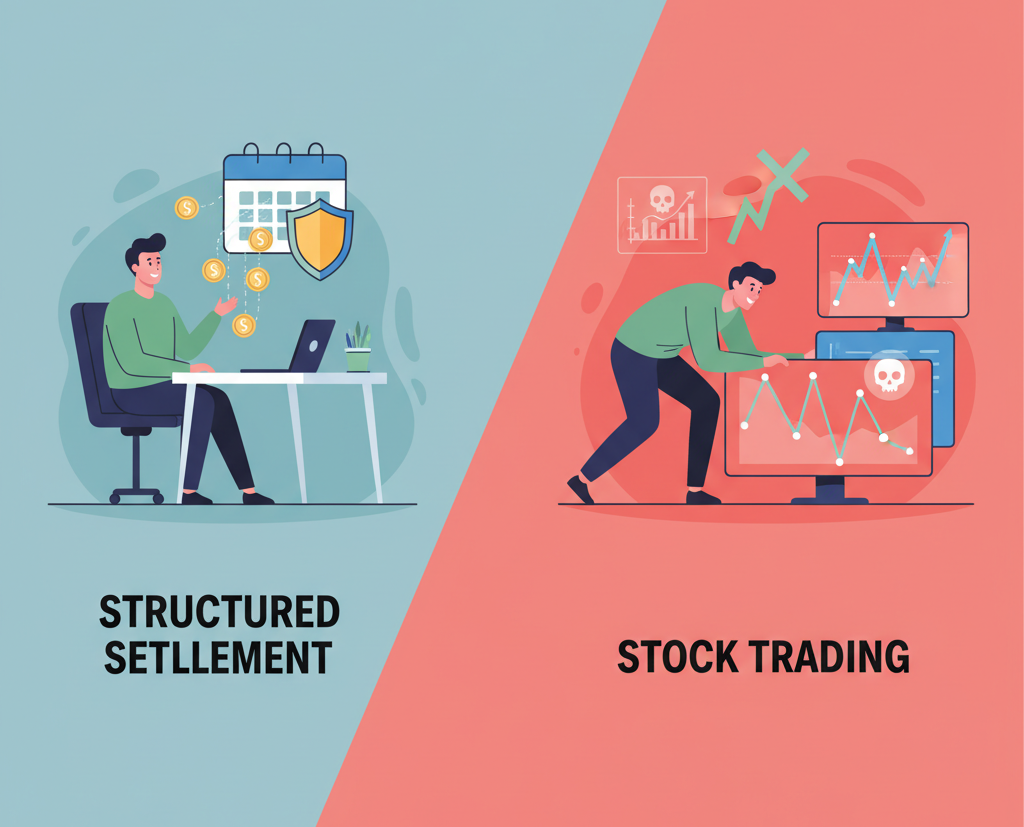When people receive a large settlement or financial award, they often wonder: Should I keep my money in a structured settlement or invest it in the stock market?
In 2025, with markets facing ongoing volatility, this question is more relevant than ever. Stocks offer potential for high returns, but they come with major risks. Structured settlements, on the other hand, provide guaranteed, stable payments with little to no risk.
This article compares structured settlements and stocks side by side, helping you determine which option aligns better with your financial goals.

What Are Structured Settlements?
A structured settlement provides regular, guaranteed payments over time, usually tax-free.
Advantages:
- Predictable income stream.
- IRS-approved and often tax-exempt.
- No exposure to market crashes.
Disadvantages:
- Limited flexibility.
- Payments may not keep up with inflation.
What Are Stocks?
Stocks represent ownership shares in a company. When a company grows and profits, stockholders benefit.
Advantages:
- Potential for high growth and dividends.
- Flexibility to buy/sell anytime.
- Can outperform inflation.
Disadvantages:
- Market volatility and risk of loss.
- Requires financial knowledge.
- Gains are taxable.
Structured Settlements vs Stocks: Key Comparison
| Factor | Structured Settlement | Stocks |
|---|---|---|
| Risk Level | Very low | High |
| Returns | Stable but modest | Potentially high |
| Liquidity | Limited | High |
| Taxes | Often tax-free | Taxable |
| Best For | Safety, stability | Growth, risk-takers |
Economic Climate in 2025
- Stock Market Volatility: Tech stocks, crypto, and global markets remain unpredictable.
- Interest Rates: Rising interest rates affect investment returns.
- Inflation Concerns: Structured settlements may lag behind inflation, while stocks can hedge against it.
When to Choose Structured Settlements
✅ You need steady, risk-free income.
✅ You don’t want to worry about market crashes.
✅ You prefer tax advantages.
When to Choose Stocks
✅ You want to grow your wealth aggressively.
✅ You understand investment risks.
✅ You can afford potential losses.
Real-Life Scenario
Imagine a $500,000 settlement:
- Structured Settlement: $25,000 per year for 20 years, tax-free.
- Stocks: Invested in the S&P 500, which historically averages ~7% annually. After 20 years, it could grow to over $1.9 million — but it could also crash and lose value during market downturns.
Pros & Cons
Structured Settlements
✅ Guaranteed stability
✅ Tax advantages
✅ Low stress
❌ Limited growth
❌ Not inflation-proof
Stocks
✅ High growth potential
✅ Flexible and liquid
✅ Can beat inflation
❌ Risk of large losses
❌ Taxable gains
Conclusion
Choosing between structured settlements and stocks depends on your financial priorities.
- If you value stability and guaranteed payments, structured settlements are best.
- If you’re willing to accept risks for potential growth, stocks may be the better path.
For many people in 2025, a balanced approach—keeping part of their settlement structured while investing a portion in stocks—may provide the best of both worlds.